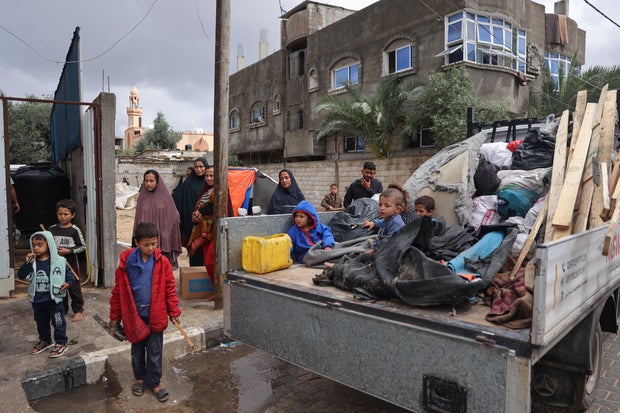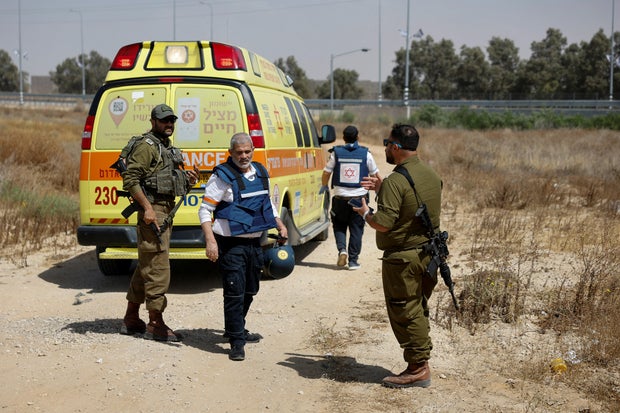By , Justine Redman, Tucker Reals
/ CBS News
Gaza crossing attacked amid cease-fire talks
Israel's military ordered Palestinians in the eastern part of the Gaza Strip city of Rafah to evacuate Monday ahead of a ground offensive long promised by the Jewish state's leaders. The message was delivered with fliers, phone calls, messages and media broadcasts in Arabic after a weekend that saw hope for a new cease-fire in the seven-month Israel-Hamas war dashed yet again.
People quickly started fleeing from the eastern part of Rafah on Monday, on foot or by any other means available to them.
Israeli Prime Minister Benjamin Netanyahu's government had stressed its intent to carry out an incursion into Rafah, Gaza's southernmost city, over the last week despite last-ditch efforts led by the U.S., Qatar and Egypt to broker a new cease-fire deal.

Those diplomatic efforts appeared to fizzle by Sunday however, with Israel and Hamas blaming each other for the impasse and Hamas then carrying out a deadly rocket attack on an Israeli military checkpoint near a key border crossing between Israel and Gaza.
President Biden has pushed Israel for weeks to limit the scope of any Rafah operation and not to launch a ground offensive on the city without ensuring the safety of more than 1 million displaced Palestinian civilians believed to have sought refuge there from across the Gaza Strip.
The Israel Defense Forces said Monday that it expected to evacuate as many as 100,000 people from the eastern part of Rafah. They were told in the messages to head several miles to the northwest, to the al-Mawasi area on Gaza's Mediterranean coast, where humanitarian relief has been prepared. The military said those preparations included basic necessities such as food, water and medicines, in addition to a field hospital.
While there had been hope last week that the latest flurry of international diplomacy might yield a new agreement to secure the release of dozens more Israeli hostages held in Gaza in exchange for a halt in the fighting — averting a Rafah offensive — the IDF appeared to be preparing for that operation in the wake of the Hamas attack on the Kerem Shalom border crossing.

Hamas militants launched the rocket attack Sunday from the eastern part of Rafah, hitting the IDF checkpoint only about 1,000 feet away, next to the crossing point. The strike killed four IDF soldiers and wounded at least several more, the military said Monday, raising the death toll given the previous day by one.
The IDF would not confirm that the evacuation order issued Monday was linked directly to the Hamas attack on the Kerem Shalom crossing.
Hamas spokesperson Sami Abu Zuhuri was quoted by the Reuters news agency Monday as saying the evacuation order constituted "a dangerous escalation" on Israel's part, which he warned would "have consequences."
Zuhuri blamed the U.S. for continuing to back Israel in the war, which was sparked by Hamas' unprecedented Oct. 7 terrorist attack on Israel, which saw the militants kill some 1,200 people and take about 240 others hostage. About 100 of those captives, including five U.S. nationals, are still believed to be alive, held by Hamas or its allies in Gaza.
The Axios news outlet, citing an unnamed official with Hamas, said Monday that the group — long designated a terrorist organization by Israel and the U.S. — was threatening to walk away from the negotiations for another hostage release and cease-fire over the evacuation order.
For the hundreds of thousands of Palestinians who've sought refuge in Rafah — many of them displaced multiple times already by Israel's war with Gaza's Hamas rulers — Monday morning brought more fear and uncertainty.
"They are calling people in the eastern area of Rafah, some also in the west, near the Rafah crossing, ordering them to leave," said Palestinian Abu Muhey, who has been sheltering with family members north of Rafah. "We don't know what to do, but I will take my family to Deir Al-Balah," he said, suggesting they would try to flee even further north in the decimated Palestinian territory.
Given the scale of destruction in Gaza already, U.S. officials have voiced concern for weeks about the feasibility of moving so many people out of harm's way in advance of any Rafah offensive. The United Nations, meanwhile, has issued a series of increasingly dire warnings that a full-scale military operation in the city would leave hundreds of thousands of civilians at risk of death.
"An Israeli offensive in #Rafah would mean more civilian suffering & deaths. The consequences would be devastating for 1.4 million people," the U.N.'s humanitarian agency for Palestinians, UNRWA, reiterated in a social media post on Monday.
"UNRWA is not evacuating," the U.N. agency stated bluntly in its tweet. "The Agency will maintain a presence in Rafah as long as possible & will continue providing lifesaving aid to people."

